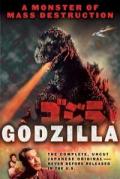Details

- Title
- Godzilla
- Director
- Ishiro Honda
- Cast
- Takashi Shimura, Sachio Sakai, Kenji Sahara, Katsumi Tezuka, Kin Sugai
- Length
- 98 min.
- Released
- 1954
Review
Currently in theaters is the original uncut, unedited, undubbed Japanese version of Godzilla, never before available in the United States. Restored are forty minutes of footage excised from the American theatrical cut (the Raymond Burr version). This includes just about everything beyond the footage of Godzilla laying waste to Tokyo. It is astonishing to see in a movie so well known, so much that is different: the characters, the story, the artistry, the metaphor. We all knew, in some capacity, that Godzilla, the creature, represented the nuclear bomb. What we didn't see was how explicitly Godzilla, the film, deals with the cultural trauma of Hiroshima. To American audiences, who see only a guy in a foam dinosaur suit, the audacity is lost: akin to if Michael Bay made a comedy about a giant lizard that crashed airplanes into office buildings. But it is a guy in a foam suit. Soft-looking foam. Making this the cute Godzilla. Like Lamb Chop, only larger. And angrier.
What has also been forgotten is how well made a film it is. It has got beautiful high-contrast black and white photography, solid performances, creative visual effects, an undercurrent of disaster.
The soundtrack is notably effective. Sort of a mix of Requiem for a Dream and Manos: the Hands of Fate. The way it cuts in and out during the destruction scenes is especially well done. The film's greatest achievement is Godzilla's screech. It is just one of those perfect sounds. The special effects, pervasive without being invasive, are a clever mix of miniatures, superimposition, Ray Harryhausen-style stop-motion and even some subtle rotoscope-style drawn-on-the-film animation.
The comparisons to Dr. Strangelove are unwarranted and unfair. Dr. Strangelove was essentially a satire, inherently distanced from the spectre of the bomb, ingenious but by nature apart from its subject. Godzilla is a far more intimate, post-traumatic re-living of the nuclear bomb. Not to say that it isn't funny. It is, but that's not what its about. And what is funny, in this restored version, is almost exclusively intentional.
The world's most famous bad movie has become a good movie that no one knows about.
- Rating
- 6/8
- Reviewer
- Pat Jackson
- Published